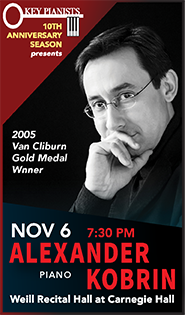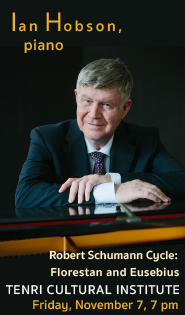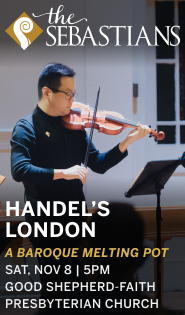Terfel returns to Carnegie, voice, charm and artistry as winning as ever

The great Welsh bass-baritone Sir Bryn Terfel returned to Carnegie Hall in recital on Tuesday evening. He was joined by pianist Annabel Thwaite and harpist Hannah Stone in a program of song that ranged from Schubert Lieder and Welsh folk songs, to the British music hall and Broadway.
Few singers are gifted with such a voice. Fewer still have such control over their instrument, let alone a chameleon-like ability to switch musical skins so effortlessly.
Regardless of style or language, Terfel’s flair for text and enunciation are at the core of his artistry. Each word of every song emerges clear and distinct, but nonetheless the musical line is tended to with equal attention. There is still plenty of roar in Terfel’s voice at 58, but he is at his finest when singing a gentle lyrical line or producing a sound so soft that there is only vibration resonating in the hall.
Terfel opened the recital with Finzi’s Let Us Garlands Bring in what he termed a trip down memory lane. These songs are Terfel’s old friends, as he first sang them while a student at the Guildhall School of Music Drama and were included in “Vagabond,” his recording of British songs that captured him in his youthful, lusty prime. The latter quality, like his voice, seemingly undiminished by the passing of time,
The Finzi are a collection of rueful elegies and witty love songs. Terfel took a light, conversational approach to “Come away, come away, death,” ending it on a mere whisper as he sang of being buried in so remote a place that no one would ever find it. In “Fear no more the heat’o’ the sun,” he emitted a dark growl when again singing of the grave. Lightness and grace were the hallmarks of such favorites as “Who is Sylvia?” and “It was a lover and his lass.”
Ballads from the great years of the British musical stage and Welsh folks songs followed. Ivor Novello won British hearts with “Keep the home fires burning” during World War I and the country embraced him until his death in 1951. Terfel lavished style and finesse on love songs such as “We’ll Gather Lilacs” and “My Dearest Dear”. While in “And Her Mother Came Too, from A to Z,” he had the audiences in stitches as he sang of the plight of a young man, whose frustrations are aptly described in the song’s title.
It goes without saying that the Welsh songs were dear to the man’s heart, but alas perhaps not quite so much for Harry and Meghan, who in Terfel’s telling nixed him singing “Ar Lan y Môr” at their wedding. After a moving performance of the simple tune, Terfel sighed “Ah, Harry!”, but quickly added that the prince’s father had different musical tastes. Terfel spoke with pride of the “one minute and 40 seconds” that he sang in Welsh at the king’s coronation.
Terfel reminded the audience that he found early fame not only in the opera house, but also as a recitalist. Top prize in 1989 Cardiff Singer of the World competition went to the late Dmitri Hvorostovsky, but Terfel took the Lieder Prize. His singing of Schubert’s “Litanei auf des Fest Allerseelen” was a sublime interlude of lyrical and emotional perfection.
To close the recital, Terfel sang songs linked by their invocation of the mysteries of the night, especially the stars. After particularly robust and impassioned accounts of Debussy’s “Nuit d’étoiles” and Schumann’s “Mein schöner Stern!” Terfel sang “O du mein holder Abendstern” from Wagner’s Tannhäuser. He quipped that the audience usually has to wait until 11:40 or so to hear it in the opera house, but it’s worth the wait. He drove that point home by singing the aria with all the mystery and beauty of sound that he could muster.
The simplicity of “All Through the Night,” sung in both Welsh and English, was followed by Terfel singing “Stars” from Les Misérables. In yet another aside, Terfel’s voice dripped with mock indignation opining that he should have been in the film version, but they gave the role to an Australian. Truth be told, the glory of his voice and his impassioned delivery, would have overwhelmed a genre, where such singing is not a marketable commodity.
Terfel was not the only performer with royal connections, as Hannah Stone served as Royal Harpist for Prince Charles over a decade ago. In addition to accompanying Terfel throughout the recital, Stone had two solo turns, John Thomas’s “Watching the Wheat”and Jesús Guridi’s “Viejo Zortzico”.
At the piano, Annabel Thwaite displayed a flair and musical temperament that was a match for Terfel in all respects. It was evident from the very first in the Finzi, but perhaps best displayed in the three Schubert songs on the program. She was an equal partner in his wondrous account of “Litanei auf des Fest Allerseelen” and like he, contributed immeasurably to a particularly dramatic “Auf dem Wasser zu Singen.”
For an encore, he sang “I wonder as I wander,” accompanied by both harp and piano. Stone returned with Deborah Henson-Conant’s “Baroque Flamenco” in a solo turn. And for the final encore, Terfel returned to Broadway with “If I were a rich man” from Fiddler on the Roof. A couple of outbursts of spontaneous rhythmic clapping quickly subsided, as no one wanted to miss a word he sang.
Juan Diego Flórez appears in recital at Carnegie Hall on November 29. carnegiehall.org







Posted Nov 20, 2023 at 1:04 pm by france graage
Tears,smiles ,laughter,Bryan Terfel evokes it all with his beautiful
performance at the Kennedy Center in washington dc yesterday
afternoon.